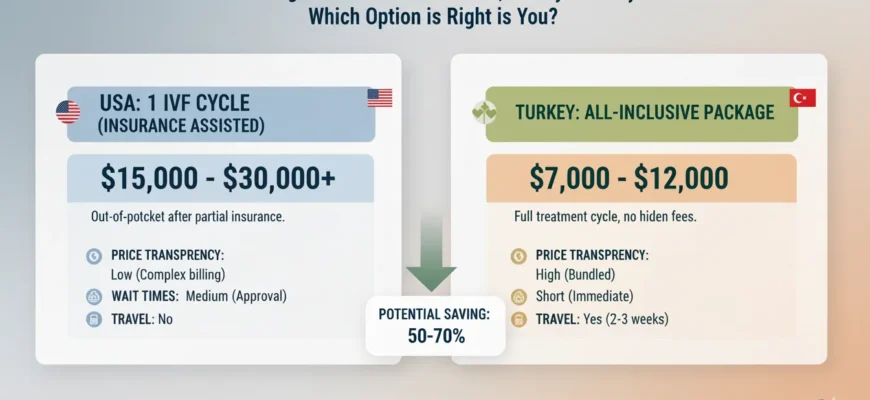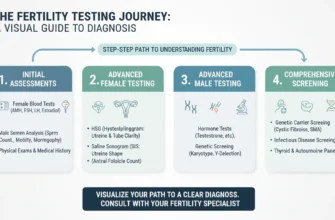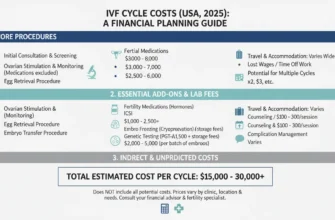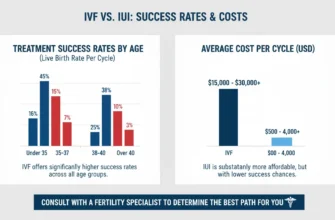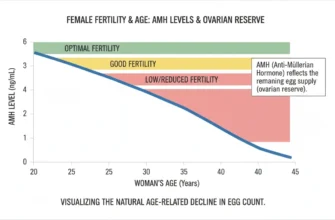IVF Coverage Decoded: Insurance vs. Turkey Self-Pay – Which Option is Right for You?
Main Takeaway: IVF patients face a pivotal choice between leveraging domestic insurance coverage and pursuing self-pay fertility treatment abroad, especially in global hubs like Turkey. Both paths offer advantages and limitations; thorough research into costs, benefits, clinic reputation, and overall patient experience – especially around IVF treatment, fertility drugs, and insurance policies – is essential for informed personal decision-making.
Navigating Your Path to Parenthood
The journey to parenthood through in vitro fertilization (IVF) draws hopeful families into a world shaped by advanced medical technology, emotional resolve, and complex financial considerations. Costs, insurance coverage, and access to fertility treatments like ovarian stimulation, egg retrieval, and embryo transfer are primary challenges. Many prospective parents find themselves balancing insurance coverage with self-pay options in destinations known for medical tourism, such as Turkey, which can profoundly influence individual finances, timelines, emotional well-being, and overall patient satisfaction.
The Emotional and Financial Journey of Infertility
Infertility treatments are emotionally and financially taxing. IVF treatment costs in the United States average between $12,000 and $18,000 per cycle, excluding medication costs, which can increase total expenses significantly. This high barrier often results in delayed or abandoned treatment. In 2023, IVF accounted for over 95,000 births in the U.S., underlining its essential role in modern family building. The emotional pressure is further amplified by the complexities of insurance coverage and the unpredictability of total out-of-pocket expenses: deductibles, co-pays, lab procedures, and medication costs for hormone medicines or genetic testing.
Why IVF Coverage Matters: Understanding Your Family Building Options
Comprehensive fertility benefits – whether through employer health plans, government programs, or international health insurance – can make IVF accessible and affordable. However, coverage varies widely and is often limited by restrictive policies. Alternatives, especially medical tourism, offer transparent all-inclusive packages in countries like Turkey, reducing cost uncertainty and providing access to advanced technology and laboratory procedures. Knowing your options, including details about family building treatments and the IVF process, is the critical first step.
Article Overview: A Direct Comparison
This article offers a detailed comparison of two funding routes for IVF: domestic insurance coverage and medical tourism self-pay packages in Turkey. Throughout, you’ll find essential NLP queries – terms like embryo donation, fertility investigation, diagnostic testing, insurance provider, and names of reputable clinics – integrated for enriched context and research depth.
Option 1: Understanding IVF Coverage Through Insurance
Decoding Your Existing Insurance Plan for Fertility Benefits
Most patients start by reviewing their health plan for fertility benefits. Locate sections in your policy about “fertility,” “infertility,” “assisted reproductive technologies,” or “in vitro fertilization.” Scrutinize terms like deductible, co-insurance, lifetime maximum, and whether your chosen fertility clinic is in-network. Pay attention to waiting periods, pre-authorization needs, and exclusions for procedures such as Intracytoplasmic Sperm Injection (ICSI), genetic screening, and pre-implantation genetic testing.
Currently, 22 U.S. states have laws mandating some level of fertility coverage – yet scope and strength vary. In 2024, about 42% of companies reported offering fertility benefits, a significant increase but still far from universal. For example, only 36% of individual plans in Colorado cover core IVF services.
What Your Insurance Might (and Might Not) Cover
Typical fertility coverage includes initial diagnostic testing and consultations but often excludes core treatments such as egg retrieval, embryo freezing, donor eggs, donor sperm, and advanced laboratory procedures. Medications – including hormonal therapies and hormone medicines – may be partially covered, while procedures like genetic diagnosis or embryo storage fees might be excluded. Policies may cap cycle numbers, set age limits, or require meeting strict medical criteria before approving IVF.
Maximizing Your Insurance Benefits and Overcoming Obstacles
To maximize benefits:
- Obtain detailed written confirmation of coverage for each IVF cost component.
- Document all conversations with your insurance provider.
- Challenge denied claims through appeals.
- Confirm whether your preferred fertility specialist or IVF centre is in-network.
- Identify coverage for reproductive medications and frozen embryo transfer.
Administrative hurdles, unpredictable costs, and strict coverage limits remain common setbacks.
Pros and Cons of Using Insurance for IVF
| Pros | Cons |
|---|---|
| Reduced cost out-of-pocket if fully covered | High deductibles, co-pays, and uncovered services may lead to surprise expenses |
| Local convenience – no international travel | Administrative delays from waiting periods, pre-authorizations, and bureaucratic processes |
| Access to trusted, local fertility clinics | Strict coverage limits on cycles, procedures, or age may hinder treatment |
| Potential access to diagnostic procedures and genetic screening | Limited coverage availability even where mandated by law (e.g., Colorado) |
Option 2: Exploring IVF in Turkey (Self-Pay)
Why Turkey Has Emerged as a Global IVF Hub
Turkey is recognized for high success rates, experienced fertility specialists, and regulatory oversight ensuring patient safety and advanced laboratory technology. Major clinics – like Memorial Sisli Hospital, LIV Hospital, and Ege University – set benchmarks for excellence. The quality is comparable to leading clinics in European countries or the U.S., with robust international patient support, translation services, and case coordination.
Understanding the Self-Pay Model and Cost of IVF in Turkey
Self-pay IVF treatment in Turkey usually means fixed all-inclusive packages, bundling initial diagnostics, ovarian stimulation, egg retrieval, ICSI, embryo transfer, medications, and often embryo freezing. Prices range from £2,100 to £6,800 per cycle – far more affordable than in the UK or US. Clear package terms reduce financial risk and enable patients to plan for multiple attempts, increasing chances of clinical pregnancy.
Planning Your IVF Journey to Turkey
Preparation typically starts with remote consultations, where medical history and diagnostic testing are reviewed. Pre-treatment can sometimes happen locally before traveling to Turkey for the main procedures, which require a stay of two to three weeks. International patient coordinators manage logistics, including travel, accommodation, and documentation, ensuring seamless care even for cross-border fertility care scenarios.
Pros and Cons of IVF in Turkey (Self-Pay)
| Pros | Cons |
|---|---|
| Significant cost savings; multiple IVF cycles for the price of one at home | Requires travel and time off work; additional hospital stay logistics |
| Clear, upfront package pricing | Distance from home/support networks, possible anxiety navigating new systems |
| Access to advanced medical technology, embryo donation, and genetic screening | No insurance recourse for unforeseen complications |
| Immediate access – no waiting periods or pre-authorizations | Cultural/language barriers (typically well-managed at established clinics) |
The Direct Comparison: Insurance vs. Turkey Self-Pay
Financial Deep Dive: Unpacking the True Total Cost
Domestic insurance often covers only part of treatment costs, leaving families responsible for premiums, deductibles, co-pays, uncovered medications, and procedures. The unpredictable nature of insurance coverage – particularly for fertility hormones, diagnostic testing, or advanced procedures – means the “covered” cycle is rarely fully paid for.
In contrast, Turkey’s self-pay cost structure is transparent. Patients pay for all-inclusive packages; additional costs mainly involve travel, accommodation, and incidental expenses. Multiple cycles in Turkey might still add up to less than a single cycle at home, especially when factoring in fees for embryo storage, genetic testing, and donor eggs.
Beyond the Price Tag: Weighing Critical Factors
Considerations beyond cost:
- Success Rates: Top Turkish clinics match or exceed European and American averages; affordability mean more attempts and potentially higher overall success.
- Time and Convenience: Domestic insurance means local access but bureaucratic delays; Turkish self-pay means immediate treatment but travel complexity.
- Emotional Stress: Insurance creates ongoing uncertainty around coverage, billing, appeals; Turkey offers clarity about costs but introduces stress around travel and distance.
- Clinic Reputation: Always assess both local and Turkish clinics for quality, patient reviews, and proven success in reproductive treatments and IVF services.
A Personalized Decision-Making Framework
The best option is highly individualized, depending on insurance benefits, total out-of-pocket estimates, personal comfort with medical tourism, and treatment timelines. Use the following self-assessment questions:
- What does my insurance actually cover (lifetime max, cycle limits, medication)?
- What is my true out-of-pocket estimate, including IVF medication and hospital fees?
- What is my self-pay budget (IVF package in Turkey + travel + stay)?
- Do I feel comfortable with international medical care and logistics?
- What is my timeline – do I need immediate access or can I wait for insurance approvals?
- How important are local convenience and support networks versus cost certainty and treatment access?
When Insurance Might Be Better
Insurance is optimal if you have comprehensive fertility benefits, low financial exposure, and nearby access to excellent clinics. If administrative complexity is manageable and out-of-pocket risks are low, this path prioritizes convenience and family-based support.
When Turkey Self-Pay Offers a Leading Alternative
Turkey’s self-pay IVF is ideal if insurance coverage is weak, absent, or exhausted, or if maximizing your budget and increasing cycle access is critical. This is particularly true for patients prioritizing cost transparency and rapid care with reputable clinics experienced in international patients.
Empowering Your IVF Journey
Financing IVF is a profound decision that shapes your path to family-building. Both domestic insurance and Turkey self-pay solutions come with trade-offs. The right choice depends on your financial reality, medical needs, and personal preferences. Decoding your health plans, identifying IVF treatment costs, and researching reputable clinics enables empowered decision-making.
Final Recommendations
Consult with financial advisors, review insurance documentation in detail, and communicate directly with insurance providers and Turkish clinics. Vet clinics for advanced technology, reproductive health expertise, and positive patient outcomes. Prioritize your emotional well-being. Choose the path – local or global – that optimally supports a healthy, fulfilling family-building journey.
Whether through the safety net of insurance or the budget-friendly focus of Turkish medical tourism, taking proactive steps and researching thoroughly ensures the highest chance of success on your IVF journey.

